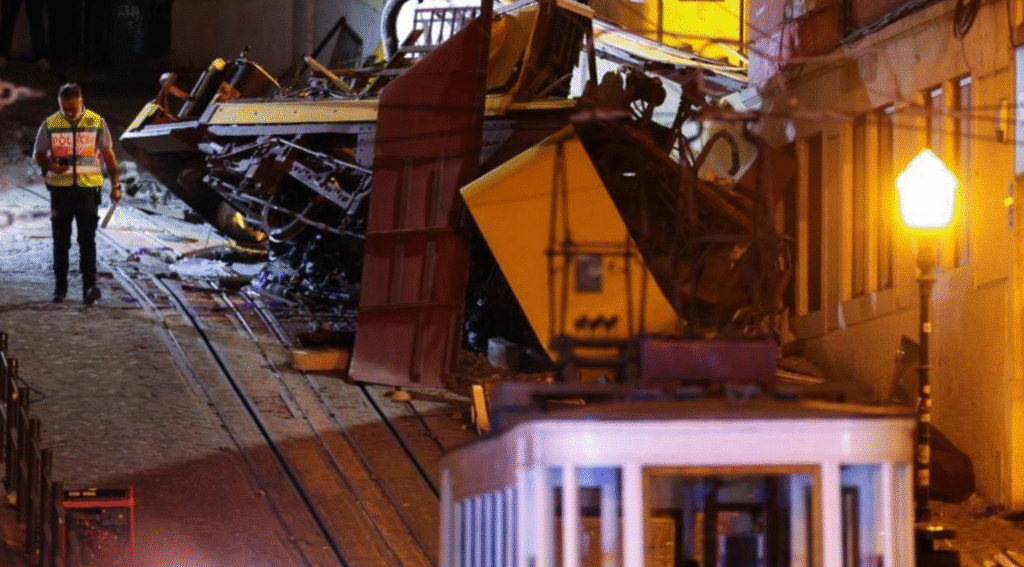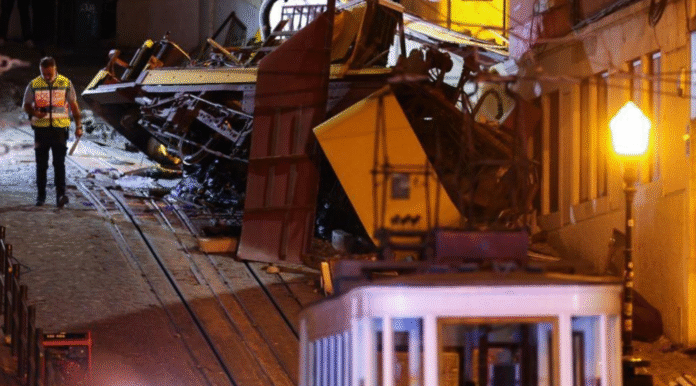The newly released Lisbon funicular crash report has unveiled alarming details about the tragic accident that claimed 16 lives in September. The preliminary findings reveal a chain of technical and management failures that led to one of the worst transport disasters in Portugal’s recent history. According to Portugal’s Air and Rail Accident Investigations Bureau, a defective and uncertified underground cable was at the heart of the catastrophe, a cable that was never meant for passenger use.
The Lisbon funicular crash report has raised serious questions about how a 140-year-old tourist attraction like the Glória funicular could have operated with such oversight gaps. What was once a beloved icon of Lisbon’s charm has now become a symbol of negligence and failed safety management.

Defective Cable Identified as the Root Cause
Investigators revealed that the cable, which acted as a counterweight between two carriages, broke suddenly, causing the Glória funicular to derail and crash into a nearby building on September 3. Shockingly, the report confirmed that the cable was technically unsuitable for passenger transportation and had never been certified for such use.
Carris, the public transport company that operates Lisbon’s trams and funiculars, reportedly purchased the defective cable in 2022. Following the release of the Lisbon funicular crash report, the company dismissed its head of maintenance, acknowledging severe procedural lapses that allowed such a component to be installed without proper inspection or certification.
Lisbon Funicular Crash Report Highlights Oversight Failures
The 100-page Lisbon funicular crash report also detailed a troubling lack of oversight from Carris engineers. Investigators found no evidence that the new cable had been tested before installation. Furthermore, the company responsible for supervising and maintaining the funicular failed to perform adequate checks.
On the morning of the tragedy, the outsourced maintenance team had reportedly given the Glória funicular the all-clear. However, investigators could not confirm whether this safety check actually took place that day.
The investigation also uncovered that the emergency brake system failed to engage properly, even though the driver had correctly attempted to activate it. Shockingly, the brake system had never been tested before being put into service.
Incomplete Findings, But Startling Implications
Despite the alarming revelations, the report stressed that the findings are preliminary. Officials cautioned that the information gathered so far is “incomplete”, with more tests and analysis still required to determine exact accountability.
“The guilt or responsibility of any organisation or person involved in the incident should not be presumed,” the report stated. However, the evidence so far suggests a deeply flawed system of checks and balances that may have contributed to the tragic event.
Officials Respond to the Lisbon Funicular Crash Report
Lisbon’s Mayor, Carlos Moedas, who was re-elected shortly after the crash, addressed public criticism following the report’s release. He told SIC television that the tragedy was caused by technical issues, not political negligence. “The report reaffirms that this unfortunate tragedy was due to technical and not political causes,” Moedas said.
Carris, meanwhile, issued its own statement in response to the Lisbon funicular crash report, claiming it was “not possible at this time to state whether or not the non-conformities in the use of the cable are relevant to the accident.” The company pointed out that the same type of cable had been in use for 601 days without incident.
However, investigators noted that the use of non-certified materials in a public transport system still represented a major safety violation, regardless of whether it had caused prior problems.
Carris Faces Scrutiny Over Procurement and Maintenance
Carris further clarified that although the defective cables were brought into use under the current board of directors, which took office in May 2022, the procurement process began under the previous administration. This revelation has added another layer of complexity to the ongoing inquiry, as investigators attempt to determine which leadership team bears the most responsibility.
Among the recommendations outlined in the Lisbon funicular crash report, one of the most urgent is the creation of a new safety management system aligned with European best practices. This would include regular audits, mandatory safety certifications for all equipment, and comprehensive staff training.
Lisbon Funiculars Ordered to Halt Operations
As an immediate consequence of the crash and its preliminary report, all of Lisbon’s cable-driven transport systems have been ordered to suspend operations until further safety inspections are completed. Authorities emphasized that all braking systems must be re-evaluated to ensure they can stop carriages even if a cable fails, a failure that tragically occurred in the Glória accident.
Investigators also recommended closing a longstanding legal loophole that exempts Lisbon’s historic funiculars from the same regulatory oversight that applies to other forms of public transport. This loophole, experts say, has allowed maintenance standards to lag behind modern safety requirements.

Lisbon Funicular Crash Report Promises Full Investigation
The Bureau stated that the full accident report would take approximately 11 months to complete. If delays occur, a detailed interim report will be released to keep the public informed. The bureau has pledged to deliver transparent findings and ensure that lessons from this tragedy lead to meaningful reform.
Meanwhile, local residents and tourists alike have been mourning the victims. Sixteen people lost their lives, including 11 foreigners, among them three British nationals, and 20 others sustained injuries. Memorials have been set up near the crash site, where flowers, candles, and messages of grief line the street.
Public Outcry and International Attention
The Lisbon funicular crash report has drawn international media coverage from outlets such as BBC News and The Guardian. Many are calling for stricter safety protocols not only in Lisbon but across Europe’s historic transport systems, where modernization often struggles to keep pace with tourism demand.
Experts argue that while the charm of vintage transport is invaluable to tourism, human lives must always come first. The crash has sparked a nationwide debate on whether nostalgia has been prioritized over passenger safety.
Looking Ahead: Lessons from the Lisbon Funicular Crash Report
The tragic Glória funicular accident has served as a wake-up call for both city officials and transport authorities. It underscores the importance of preventive maintenance, transparent oversight, and technical certification in public infrastructure.
As Lisbon begins to rebuild trust, authorities promise that such negligence will never happen again. The full findings of the Lisbon funicular crash report are expected to bring accountability, reform, and, hopefully, safer journeys for millions of passengers in the future.

